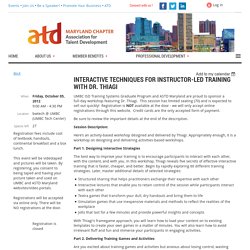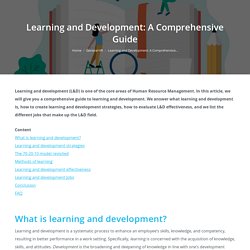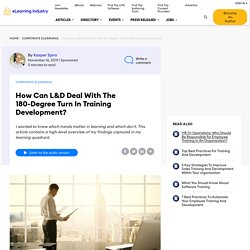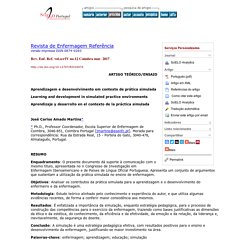

Novice Versus Expert Design Strategies: The eLearning Coach. Common sense tells us that we should design differently for novices than for experts.

Wouldn’t you expect a novice swimmer to learn new strokes differently than an advanced swimmer? But if common sense doesn’t convince you of this, then the expertise reversal effect will. What It Is The basic tenet of the expertise reversal effect, based on convincing research, is that a person’s level of prior knowledge greatly influences the effectiveness of learning materials. So that instructional approaches that are beneficial for beginning learners are often ineffective or even detrimental for advanced learners. It’s all based on the theory of cognitive load. For example, novices in a subject need extra instructional guidance, like demonstrations of how to work through a problem or task or replacing text with a voice over to avoid split attention.
Thou Shalt Not Interfere Why does the reversal effect happen? Design Strategies References: Kalyuga, Slava. ATD Maryland, Inc. - Interactive Techniques for Instructor-Led Training with Dr. Thiagi. UMBC ISD Training Systems Graduate Program and ASTD Maryland are proud to sponsor a full-day workshop featuring Dr.

Thiagi. This session has limited seating (70) and is expected to sell out quickly! Registration is NOT available at the door - we will only accept online registrations through this website. Credit cards are the only accepted form of payment. Be sure to review the important details at the end of the description. Session Description: Here’s an activity-based workshop designed and delivered by Thiagi. Part 1. The best way to improve your training is to encourage participants to interact with each other, with the content, and with you.
With Thiagi's framegame approach, you will learn how to load your content on to existing templates to create your own games in a matter of minutes. Try Thiagi’s Four Door Model. eLG 4 DoorModel. Instructional Design. Instructional Design We do It faster, cheaper and better!

Our instructional design approach is unique. Here are eight reasons why: Business results. Our training materials and methods produce measurable business results and personal growth. Learning and Development: A Comprehensive Guide. Learning and development (L&D) is one of the core areas of Human Resource Management.

In this article, we will give you a comprehensive guide to learning and development. We answer what learning and development is, how to create learning and development strategies, how to evaluate L&D effectiveness, and we list the different jobs that make up the L&D field. Content What is learning and development? Learning and development strategies The 70-20-10 model revisited Methods of learning Learning and development effectiveness Learning and development Jobs Conclusion FAQ What is learning and development?
Learning and development is a systematic process to enhance an employee’s skills, knowledge, and competency, resulting in better performance in a work setting. Learning, training, and development are often used interchangeably. In the next section, we’ll dive into how learning & development can be leveraged in an organization. 74% of companies are failing at Digital HR Transformation. The eLearning Coach - For designing smarter learning experiences. Moodle. Those of us who work in L&D right now are quite lucky.

We're part of a profession that’s in the midst of a fascinating transformation. In this article, we’ll dive into some of the developments that are at the heart of this transformation. We’ll look at their impact on the systems used for delivering L&D and how learning content is likely to be generated in the future. The Shift Toward Informal Learning You’re probably pretty familiar with formal learning. Nowadays, employees have the whole of the internet available to find the information they require.
A More Bottom-Up Approach To Learning Traditional, formal learning methods rely heavily on a top-down approach from L&D, with objectives pushed down, and employees expected to follow. A Focus On Skills Rather Than Knowledge Many L&D professionals have come round to the idea that it doesn’t matter how much you know if you’re not able to apply that knowledge. Moving From LMS To LXP This is where Learning Experience Platforms (LXPs) come in. Ulfpie053174 tm anexo17. Aprendizagem e desenvolvimento em contexto de prática simulada. Aprendizagem e desenvolvimento em contexto de prática simulada Learning and development in simulated practice environments Aprendizaje y desarrollo en el contexto de la práctica simulada José Carlos Amado Martins* * Ph.D., Professor Coordenador, Escola Superior de Enfermagem de Coimbra, 3046-851, Coimbra Portugal [jmartins@esenfc.pt].

Morada para correspondência: Rua da Estrada Real, 15 - Portela do Gato, 3040-478, Almalaguês, Portugal. Enquadramento: O presente documento dá suporte à comunicação com o mesmo título, apresentada no V Congresso de Investigação em Enfermagem Iberoamericano e de Países de Língua Oficial Portuguesa. Objetivos: Analisar os contributos da prática simulada para a aprendizagem e o desenvolvimento do enfermeiro e da enfermagem. Metodologia: Estudo teórico alinhado pelo conhecimento e experiência do autor, e que utiliza algumas evidências recentes, de forma a conferir maior consistência aos mesmos. Palavras-chave: enfermagem; aprendizagem; educação; simulação Introdução.